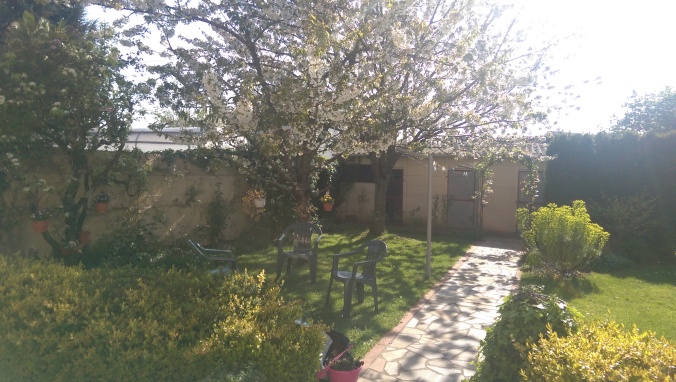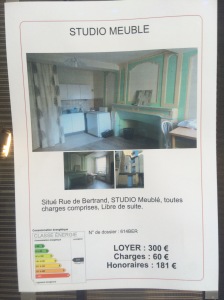
My landlady’s backyard garden in Rennes, which she takes very seriously.
While it varies somewhat by geographical region as well as from urban to rural, the general standard for finding a place to live as a renter in the United States is similar wherever one may try. Verifiable employment or other source of income, three times the rent in income proven on paper, a clean rental record, a criminal background check, a security deposit, and often the last month’s rent paid in advance at the same time that the first month’s rent is due. Add to that other additional charges such as “pet rent” and “nonrefundable cleaning fees”, and its easy to see rather quickly why poor folks have such a hard time finding a place to live despite being fully employed.
While such standards are not always as rigidly enforced in less desirable areas and neighborhoods, for those who live in “up-and-coming” or newly gentrified areas, the inability to meet these standards has created an entire new class of homeless people, folks who work, often have good credit and good rental histories, often are formerly middle-class, but have now been relegated to outsider status on account of increasingly competitive and predatory rental markets.
In the past decade, I have moved no less than ten times. And every single time, meeting these standards has caused an incredible amount of stress and agony, especially as a self-employed person who often cannot prove my income to the satisfaction of landlords and even more so to rental agencies, which tend to be even more strict. Further adding to those complications was my increasing public visibility as a homelessness activist while living in Eugene, Oregon, which eventually became a source of blacklisting when it came to finding a place to live. Even if I fulfilled all the requirements of the landlord, many made it bluntly clear to me that they did not want to rent to me because they did not want me having “those people” around the house all the time. And it was that which became one of the primary reasons why I left Eugene for Portland, after living for a year in a mold-infested apartment and unable to find anywhere else due to the combination of their prejudice and my reputation.
In Portland, I was lucky enough to qualify for and be accepted as a tenant in a federally subsidized building that is restricted to low-income tenants, using a federal formula that calculates the local area medium income and only accepts tenants who make less than 60% of that figure. Many of the other standard requirements for renting an apartment are also relaxed under their policies – one only needs to show one-and-a-half times the rent in income on paper, they are more reasonable with folks who have poor credit, the security deposit is less than a month’s rent, and last month’s rent in advance is not required. These relaxed standards were the only reason I was able to move to Portland in the first place. And while I am grateful that I have a decent place to live in a nice neighborhood, the reality is that if I ever wanted to leave, I would have to leave the city altogether, as there is absolutely nowhere in the city limits where I would both be able to meet the rental requirements and afford the rent itself. I’m grateful, especially considering the long waiting lists for housing like mine, but I’m also stuck.
* * * * *
When I first came to France last spring, the last thing I was thinking about was living there. But then I saw ads like this:

My reaction was that of utter shock. I had always heard and assumed without investigating that living in a country like France was just as expensive if not more than living in the United States. And if I wanted to live in Paris, there would be truth to that. But from an American perspective, the rents in Rennes were cheap as dirt. Fair market rate for a studio here was less than half of what I was paying for a similarly sized federally subsidized apartment back in Portland.
The rental prices were only one of many factors that drew me to come back. My health was the other primary factor, which I will write about more in depth in the future. But after a few days, every time I would walk past a real estate office, of which there seems to be one on every block, I would stand there and stare with my mouth open, over and over again, and few weeks of repeating this ritual a daily basis I was still shocked every time I did it.
“Well, why don’t you just move to France?” everyone said to me.
I wanted to, but it’s not that easy. The French government doesn’t just let Americans come over here and stay permanently, especially not low-income, disabled Americans like myself. The ability to gain permanent residency status in France as a foreigner depends mainly on one’s financial affluence and/or their ability to find gainful employment here. When I decided last fall that I needed to return, I first explored the possibility of obtaining a long-stay visa, but quickly realized that for a few different reasons I would not be able to meet the requirements (I will also elaborate on this in a future post). So as it currently stands, without a long-term visa I’m bound by the the Schengen area regulations, which mandate that I can only spend 90 days in the Schengen zone and then spending 90 days out of the zone before I can legally re-enter.
And this complicated the housing issue, because as affordable as the rents are here in Rennes, rental agencies do not want to rent a studio to someone for only three months. While the rental requirements through an agency are not as stringent as they are in the United States, they still usually require a year-long lease. And most websites that cater to short-term rentals are geared towards tourists and rent either by the day or by the week at highly inflated prices compared to long-term monthly rentals.
After combing the internet for a few weeks without much luck, I finally found a lead on a short-term rental through a website called Roomlala, which focuses on short-term rentals and work-trades but not so much for tourists. I emailed the landlady through the website, and she replied positively and told me that the room was still available and asked me to call her.
My French is decent when I’m reading or writing it, but I have a very hard time comprehending spoken French, especially when I can’t see the person’s facial expressions. I explained this to her through messaging, but she told me that it didn’t matter and to call her anyway. I agreed, realizing that this was probably her way of confirming that I was who I said I was as opposed to actually relaying information. Luckily, Rhyd was staying at my place in Portland while this was all occurring, and as his French is better than mine I had him assist with the call.
What transpired was a rather hilarious ten minutes in which neither side really understood much of what the other was saying, but as opposed to being annoyed or frustrated, it was clear that she found it quite amusing. By the end of the call, she told me that the place was mine and she looked forward to my arrival.
I should note at this point that this occurred in the first week of February, and I wasn’t due to arrive in Rennes until March 24th. The idea that she would hold the room for six weeks without any sort of compensation seemed unlikely to me, but I was desperate to secure it, so after the call was over I messaged her and asked her how much she wanted to hold it. She replied to me immediately, telling me that it was not necessary. Again making assumptions based on my experiences in the United States, I then asked her how she wanted me to send her the first month’s rent… did she want me to Paypal her or send an international money order? She again told me that it wasn’t necessary, and that I could just pay her when I arrived.
Other than the verification needed to join Roomlala, which consisted of a scan of my passport and verifying my phone number through a text code, no other information was asked from me. No credit check, no proof of income, nothing. She was perfectly willing to rent a room for three months to someone who was living 6,000 miles away based on a passport photo and a ten minute phone call in which neither side really understood the other. And despite making clear to me that she spoke absolutely no English, the language barrier also did not seem of any concern to her.
* * * * *
Six weeks later, on March 25th right on schedule, I arrived at my new place. I rang the doorbell and an an smiling older woman answered the door giving me a kiss on each cheek in the customary French style.
“Bonjour! Ça va?” she asked me, as though we were already old friends.
“Oui, ça va,” I answered, and immediately felt at home.

Closing shutters, the best thing ever.
She took me upstairs where my room was located, and showed me in detail how the shutters worked, realizing correctly that as an American I had no idea how to operate such a sensible device. After showing me around the rest of the house and giving me a tour of her backyard garden, she brought me into the living room where she had a notebook. She then asked me to write down my name, American address, phone number, and occupation. I did so, assuming it was for a lease, and consulted Google Translate as I didn’t know the right word.
“Est-ce pour le bail?” I asked.
She shook her head and laughed. I didn’t quite understand everything she said, but she made it clear that a lease was not necessary and I’m pretty sure she said she needed the information for tax purposes. I then paid her the pro-rated rent for the rest of that month, and she handed me the keys. And that was that. Not only did I have a place to live, I could already tell that I had a landlady that would be a second mother.
* * * * *
“Alley? Bonjour, Alley!“, I heard her say as she came up the stairs.
It was a few days later, and already I was experiencing that strange timeless feeling where it’s as though one has always existed in a situation. It did not feel like “my new place” at all, it felt quite like home.
I met her at the top of the stairs. “Bonjour, ça va?”
She said something quickly that I did not catch, and then handed me a plate wrapped in foil. “Tu es trop mince,” she then said, patting my stomach as I unwrapped the foil to find a beautiful looking piece of meat.
“Merci!” I said with a smile, and kissed her on the cheek.
* * * * *
A few days after that, I was telling this story to an American friend who had spent time living in southern France in the late ’90s.
“Is this typical, or did I just luck out?” I asked her.
“Its not as common as it used to be, and its not the case in places like Paris, but every place I ever rented in Provence it was the same deal,” she said to me. “Its just a different way of life. Many landlords, especially older folks, tend to trust their instinct over the power of a signed contract. If anything, some find the idea of such formalities insulting.”
“A different way of life is putting it lightly,” I replied, remembering at that moment that I had forgotten to eat the piece of brioche that my landlady had brought me that morning.

Photo by Frédéric Bisson/Wikimedia Commons